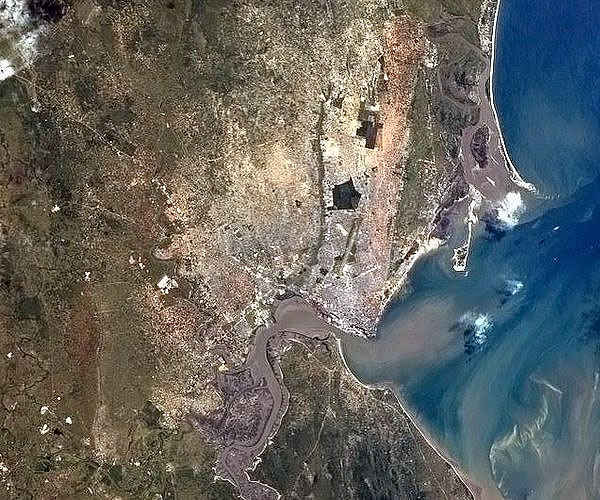
History of Mozambique
Mozambique's earliest human history began with the arrival of the San hunters and gathers, some of the earliest known homo sapiens. Over the years, increasing amounts of Bantu-speaking people arrived from the north, and became the area's first true agriculturalists.
Arab traders were the first foreigners to arrive on Mozambican soil, and they quickly established a series of trade settlements. European discovery occurred in 1498, when Portuguese explorer Vasco de Gama landed on the Mozambican coast. Following his discovery, the Portuguese colonized the region and maintained control until 1975. After a decade of sporadic warfare, Mozambique gained independence on June 25, 1975 under the leadership of FRELIMO.
Between 1975 and 1976, the vast majority of Portuguese citizens fled from Mozambique, leaving the country's economy and government in disarray. FRELIMO, a party who drew inspiration from the Soviet Union, quickly filled that void and built a one-party socialist state. This establishment served as a spark for a 15-year civil war between FRELIMO and RENAMO, both of which were supported by international forces, predominantly in South Africa. Over 1 million people lost their lives during this war, and many more were displaced.
In 1990, as support for RENAMO lessened, both parties entered into a series of talks that ultimately gave way to a new constitution in 1990 and the Rome General Peace Accords, signed in 1992. The first democratic elections were held in 1994, which ushered in a FRELIMO majority under Joaquim Chissano. RENAMO formed the official opposition, led by Afonso Dhlakama.
Delicate reconstruction has characterized Mozambique's recent democratic era. The nation has held a series of free and fair elections that have consistently elected a FRELIMO majority. Investors from Portugal, South Africa and East Asia have assisted in the economic growth of the country; however, RENAMO launches frequent criticisms on the government's transparency and accountability.
History of Maputo
In the mid-nineteenth century, Portuguese colonialists settled what is today known as Maputo. Named Lourenço Marques, the city's development was sparked by the establishment of a major port serving all of southern Africa. In 1887, Maputo replaced Ilha de Moçambique as the nation's capital. Throughout the remainder of Mozambique's colonial period, Lourenço Marques developed into a coveted cosmopolitan center. Art, theatre, shopping and architecture - with a uniquely Portuguese flare - attracted visitors from across the globe. However, as is characteristic of the colonial period, much of the wealth was concentrated in the hands of the foreign elite.
In the 1960s, as independence movements swept across the continent, Mozambique too began its struggle for freedom. 10 years of armed struggle ultimately ended with the demise of Portuguese colonial rule on June 25th, 1975. The capital was quickly renamed Maputo, and most recognition of Portuguese heroes were removed. The majority of Portuguese nationals fled immediately, which left large voids in the management of the city. FRELIMO, a party inspired by the Soviet Union, filled this void with a harsh and unilateral rule. This ultimately sparked a 15-year civil war that left over a million dead, and many more displaced.
In 1992, Mozambique's civil war drew to a close with the signing of the 1992 Peace Accord by FRELIMO and RENAMO. The years since have been characterized by reconstruction and growth. Externally-funded initiatives like PROMAPUTO have sought to restore the city's architecture and vibrancy - and slowly, they are experiencing successes. However, the city continues to struggle with the delivery of basic services - such as water, electricity and waste disposal.
Update 15/06/2015
Keep more of your money when transferring funds overseas!

If you want to move money abroad, from Mozambique or to Mozambique for example, Fexco provides efficient and secure global bank to bank transfers and bespoke payment solutions for both business and personal clients.
Why Fexco
Fexco provides a secure international money transfer service online or by telephone with bank beating fx rates and low fees. Specialises in high-value transfers.
Main characteristics
Fexco will help you to keep your overseas money transfer costs to a minimum.
| Margin | 0.6% |
|---|---|
| Regulator | FCA |
| Fee | £10 < £5K or Free > £5k |
| Mini | £1K |
| Ccy | All (130 currencies, incl ‘exotics’) |
| Services | Repatriation of funds, Property, Regular payments, High Value payments, spot, online, telephone. |
Get an online quote today
When you are ready to make your transfer, John and his team will be available to help you with better rates and an unrivalled service to make sure your funds are delivered securely and speedily.
